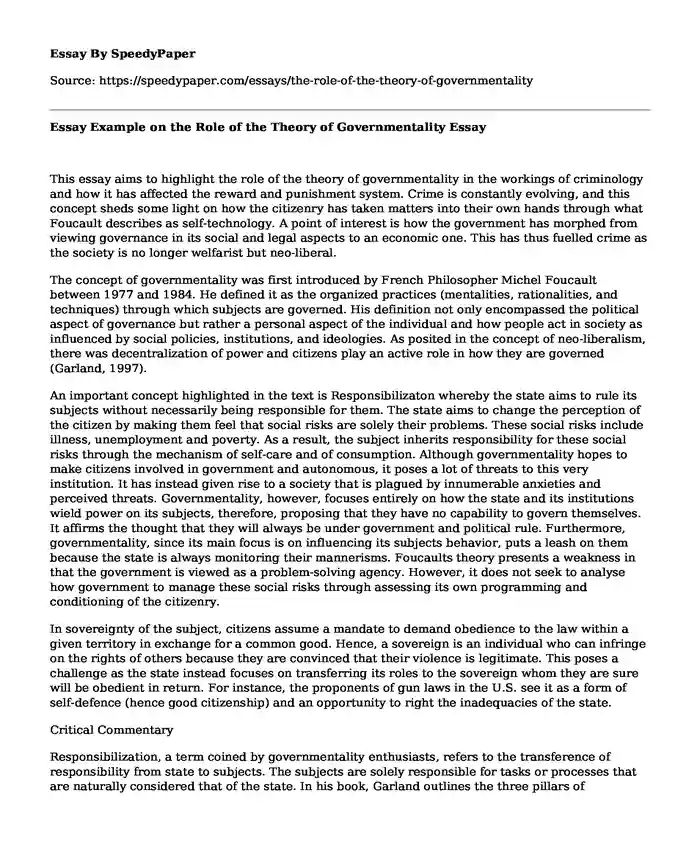
| Type of paper: | Essay |
| Categories: | Criminal law Government |
| Pages: | 4 |
| Wordcount: | 827 words |
This essay aims to highlight the role of the theory of governmentality in the workings of criminology and how it has affected the reward and punishment system. Crime is constantly evolving, and this concept sheds some light on how the citizenry has taken matters into their own hands through what Foucault describes as self-technology. A point of interest is how the government has morphed from viewing governance in its social and legal aspects to an economic one. This has thus fuelled crime as the society is no longer welfarist but neo-liberal.
The concept of governmentality was first introduced by French Philosopher Michel Foucault between 1977 and 1984. He defined it as the organized practices (mentalities, rationalities, and techniques) through which subjects are governed. His definition not only encompassed the political aspect of governance but rather a personal aspect of the individual and how people act in society as influenced by social policies, institutions, and ideologies. As posited in the concept of neo-liberalism, there was decentralization of power and citizens play an active role in how they are governed (Garland, 1997).
An important concept highlighted in the text is Responsibilizaton whereby the state aims to rule its subjects without necessarily being responsible for them. The state aims to change the perception of the citizen by making them feel that social risks are solely their problems. These social risks include illness, unemployment and poverty. As a result, the subject inherits responsibility for these social risks through the mechanism of self-care and of consumption. Although governmentality hopes to make citizens involved in government and autonomous, it poses a lot of threats to this very institution. It has instead given rise to a society that is plagued by innumerable anxieties and perceived threats. Governmentality, however, focuses entirely on how the state and its institutions wield power on its subjects, therefore, proposing that they have no capability to govern themselves. It affirms the thought that they will always be under government and political rule. Furthermore, governmentality, since its main focus is on influencing its subjects behavior, puts a leash on them because the state is always monitoring their mannerisms. Foucaults theory presents a weakness in that the government is viewed as a problem-solving agency. However, it does not seek to analyse how government to manage these social risks through assessing its own programming and conditioning of the citizenry.
In sovereignty of the subject, citizens assume a mandate to demand obedience to the law within a given territory in exchange for a common good. Hence, a sovereign is an individual who can infringe on the rights of others because they are convinced that their violence is legitimate. This poses a challenge as the state instead focuses on transferring its roles to the sovereign whom they are sure will be obedient in return. For instance, the proponents of gun laws in the U.S. see it as a form of self-defence (hence good citizenship) and an opportunity to right the inadequacies of the state.
Critical Commentary
Responsibilization, a term coined by governmentality enthusiasts, refers to the transference of responsibility from state to subjects. The subjects are solely responsible for tasks or processes that are naturally considered that of the state. In his book, Garland outlines the three pillars of Responsibilization in managing crime as privatization, managerialism, governing at a distance. The downside to the concept of Responsibilization is that it facilitates the practice of subjects taking responsibility for their actions to satisfy the objectives of the state and not their own. It is indeed not a mechanism of self-policing but actualizing the governments objective of ruling from a distance. As a result, citizens engage actively in non-state agencies to manage social risks such as terrorism, crime and racism.For instance, in India, South Africa and the United States of America, citizens are not really exercising their natural rights but indulging in the sovereign power of the government. This is seen as an end solution as citizens do not view this as a failure on the part of the government but an opportunity to view themselves as sovereign subjects who are working for the common.
Gun politics cut across, and often exacerbate, enduring forms of inequality, disempowerment and privilege (Carlson, 2014). The concept of governmentality is however not very familiar to non-western governments and for this reason, they are still able to maintain their sovereignty and power. Citizens emerging needs to perform state functions ought to be eliminated to avoid wanton violence and deaths, even anxieties harboured by them. The sovereign states ought to strike a balance between monopolization of its services and citizens active participation in it. All in all, governmentality fails to recognize the creation of a social abject that is considered unworthy of life and in turn suggests that sovereign subjects exceed the confines of the state.
References
Carlson, J. D. (2014). States, subjects and sovereign power: Lessons from global gun cultures. Theoretical Criminology, 335 353.
Garland, D. (1997). Governmentality and the problem of crime. Theoretical Criminology, 173-214.
Cite this page
Essay Example on the Role of the Theory of Governmentality. (2019, Jun 24). Retrieved from https://speedypaper.net/essays/the-role-of-the-theory-of-governmentality
Request Removal
If you are the original author of this essay and no longer wish to have it published on the SpeedyPaper website, please click below to request its removal:
- Free Essay with the Teen Depression Case Study
- Navigation Plan Essay, Free Example for You
- Metamorphosis which Gregor's Room Undergoes, Literary Essay Example
- Paper Sample about Antigone, An Annotated Bibliography
- Art Essay Example: Guernica by Picasso
- Compare and Contrast Essay on Cameroon and Stokeling Cases
- Essay Example: Read Research Articles
Popular categories




